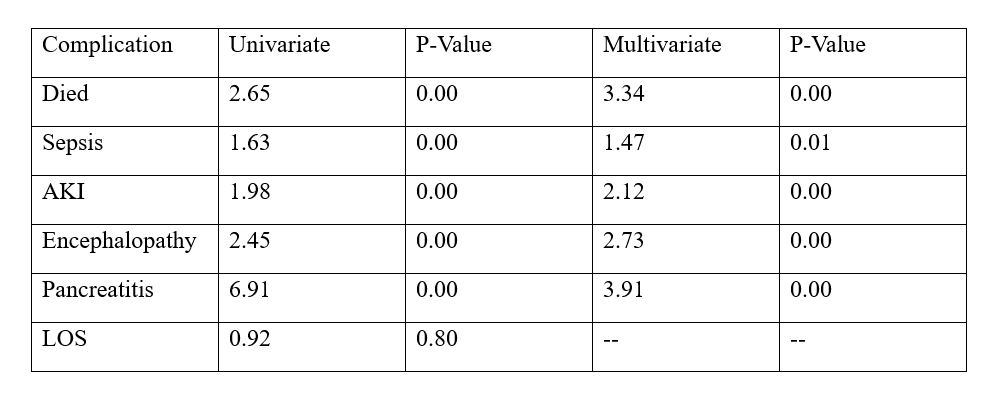Tuesday Poster Session
Category: Biliary/Pancreas
P4341 - Clinical Implications of Alcohol-Related Liver Disease in Patients With Choledocholithiasis: A Retrospective National Study
Tuesday, October 28, 2025
10:30 AM - 4:00 PM PDT
Location: Exhibit Hall

Adham Obeidat, MD (he/him/his)
presbyterian Hospital
Albuquerque, NM
Presenting Author(s)
Adham Obeidat, MD1, Gicel J. Aguilar, BS, DO2, Alan Gabriel. Ortega Macias, MD2, Gulshan Parasher, MD, FACG2
1presbyterian Hospital, Albuquerque, NM; 2University of New Mexico, Albuquerque, NM
Introduction: Choledocholithiasis is a common hepatobiliary condition requiring hospitalization and often associated with significant complications. Alcohol-related liver disease (ALD) may predispose patients to worse outcomes. This study aimed to evaluate the impact of ALD on in-hospital outcomes among patients admitted with choledocholithiasis.
Methods: We conducted a retrospective cohort study using the National Inpatient Sample (NIS) from 2019 to 2021. Adult patients with a diagnosis of choledocholithiasis were identified using ICD codes and stratified based on the presence or absence of ALD. Demographic and clinical characteristics were compared between groups. Multivariate logistic regression was used to identify independent predictors of in-hospital mortality and complications.
Results: Among 19,023 hospitalized patients with choledocholithiasis, 431 (2.3%) had a concurrent diagnosis of ALD. Patients with ALD were younger (mean age 57.8 vs. 61.9 years), more likely to be males (64.0% vs. 36.2%), with longer hospital stays (6.3 vs. 4.9 days) and higher mean total hospital charges ($82,760 vs. $70,152). ALD patients had higher rates of in-hospital mortality (3.94% vs. 1.52%), malnutrition (11.4% vs. 4.9%), sepsis (12.1% vs. 7.8%), acute kidney injury (AKI) (29.2% vs. 17.2%), encephalopathy (10.9% vs. 4.8%), pancreatitis (6.7% vs. 1.0%), and hyponatremia (26.2% vs. 9.3%).
On multivariate analysis, ALD was independently associated with increased odds of in-hospital mortality (OR 3.34, p< 0.001), sepsis (OR 1.47, p=0.01), AKI (OR 2.12, p< 0.001), encephalopathy (OR 2.73, p< 0.001), and pancreatitis (OR 3.91, p< 0.001). Additional independent predictors of mortality included malnutrition (OR 3.43, p< 0.001), hyponatremia (OR 1.73, p< 0.001), and hypertension (OR 1.53, p=0.01).
Discussion: Alcohol-related liver disease is associated with worse in-hospital outcomes in patients admitted with choledocholithiasis, including increased mortality and in-hospital complications. Early identification of these high-risk patients may help guide timely interventions and improve clinical outcomes.

Figure: Table 1. Univariate and Multivariate analysis of ALD as a potential predictor of in-hospital complications in patients admitted with choledocholithiasis.
Disclosures:
Adham Obeidat indicated no relevant financial relationships.
Gicel Aguilar indicated no relevant financial relationships.
Alan Ortega Macias indicated no relevant financial relationships.
Gulshan Parasher indicated no relevant financial relationships.
Adham Obeidat, MD1, Gicel J. Aguilar, BS, DO2, Alan Gabriel. Ortega Macias, MD2, Gulshan Parasher, MD, FACG2. P4341 - Clinical Implications of Alcohol-Related Liver Disease in Patients With Choledocholithiasis: A Retrospective National Study, ACG 2025 Annual Scientific Meeting Abstracts. Phoenix, AZ: American College of Gastroenterology.
1presbyterian Hospital, Albuquerque, NM; 2University of New Mexico, Albuquerque, NM
Introduction: Choledocholithiasis is a common hepatobiliary condition requiring hospitalization and often associated with significant complications. Alcohol-related liver disease (ALD) may predispose patients to worse outcomes. This study aimed to evaluate the impact of ALD on in-hospital outcomes among patients admitted with choledocholithiasis.
Methods: We conducted a retrospective cohort study using the National Inpatient Sample (NIS) from 2019 to 2021. Adult patients with a diagnosis of choledocholithiasis were identified using ICD codes and stratified based on the presence or absence of ALD. Demographic and clinical characteristics were compared between groups. Multivariate logistic regression was used to identify independent predictors of in-hospital mortality and complications.
Results: Among 19,023 hospitalized patients with choledocholithiasis, 431 (2.3%) had a concurrent diagnosis of ALD. Patients with ALD were younger (mean age 57.8 vs. 61.9 years), more likely to be males (64.0% vs. 36.2%), with longer hospital stays (6.3 vs. 4.9 days) and higher mean total hospital charges ($82,760 vs. $70,152). ALD patients had higher rates of in-hospital mortality (3.94% vs. 1.52%), malnutrition (11.4% vs. 4.9%), sepsis (12.1% vs. 7.8%), acute kidney injury (AKI) (29.2% vs. 17.2%), encephalopathy (10.9% vs. 4.8%), pancreatitis (6.7% vs. 1.0%), and hyponatremia (26.2% vs. 9.3%).
On multivariate analysis, ALD was independently associated with increased odds of in-hospital mortality (OR 3.34, p< 0.001), sepsis (OR 1.47, p=0.01), AKI (OR 2.12, p< 0.001), encephalopathy (OR 2.73, p< 0.001), and pancreatitis (OR 3.91, p< 0.001). Additional independent predictors of mortality included malnutrition (OR 3.43, p< 0.001), hyponatremia (OR 1.73, p< 0.001), and hypertension (OR 1.53, p=0.01).
Discussion: Alcohol-related liver disease is associated with worse in-hospital outcomes in patients admitted with choledocholithiasis, including increased mortality and in-hospital complications. Early identification of these high-risk patients may help guide timely interventions and improve clinical outcomes.

Figure: Table 1. Univariate and Multivariate analysis of ALD as a potential predictor of in-hospital complications in patients admitted with choledocholithiasis.
Disclosures:
Adham Obeidat indicated no relevant financial relationships.
Gicel Aguilar indicated no relevant financial relationships.
Alan Ortega Macias indicated no relevant financial relationships.
Gulshan Parasher indicated no relevant financial relationships.
Adham Obeidat, MD1, Gicel J. Aguilar, BS, DO2, Alan Gabriel. Ortega Macias, MD2, Gulshan Parasher, MD, FACG2. P4341 - Clinical Implications of Alcohol-Related Liver Disease in Patients With Choledocholithiasis: A Retrospective National Study, ACG 2025 Annual Scientific Meeting Abstracts. Phoenix, AZ: American College of Gastroenterology.
